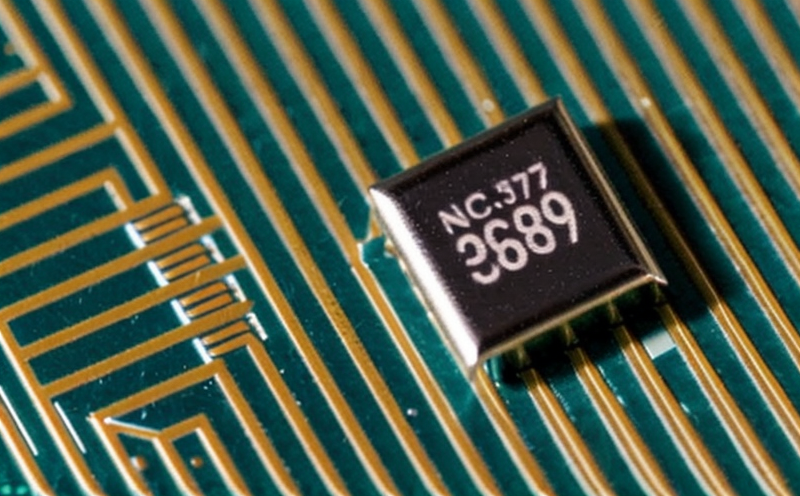IEC 60749-32 Microchip Electromigration Testing
The IEC 60749-32 standard outlines comprehensive testing protocols for semiconductor and microchip reliability, specifically addressing the phenomenon of electromigration. This process involves the migration of metal atoms within a conductor due to the movement of charge carriers in an electric current, which can lead to structural degradation over time. Ensuring that microchips withstand such effects is critical for their long-term performance and reliability.
The testing procedure follows stringent international standards, designed to simulate real-world operating conditions under high temperature and high current density. This ensures that the tested microchips meet industry requirements and can perform reliably in a wide range of applications. The process involves precise control over temperature, voltage, and time parameters to accurately replicate stressors encountered during use.
Our laboratory employs advanced test equipment capable of withstanding harsh conditions necessary for this type of testing. We ensure that each specimen is prepared meticulously according to the standards laid out in IEC 60749-32. This includes careful selection and preparation of materials, ensuring homogeneity and purity are maintained throughout the process.
The test setup allows us to monitor critical parameters such as resistance change over time, which serves as an indicator of electromigration-induced degradation. By continuously tracking these changes, we can determine whether a microchip meets the specified reliability criteria. Our team of experts meticulously analyze data from each test run, providing detailed reports that highlight areas needing improvement or compliance with industry standards.
Understanding the implications of electromigration is crucial for both quality management and R&D departments within semiconductor companies. By investing in thorough testing early on, manufacturers can identify potential issues before they become costly problems later down the line. This proactive approach not only enhances product quality but also contributes significantly to customer satisfaction by delivering robust products that last longer.
Compliance with IEC 60749-32 is essential for ensuring consistent performance across all batches of microchips produced by a manufacturer. It helps maintain high standards in the market and ensures compatibility with other components used within electronic devices. Adhering to these stringent requirements also opens up opportunities for broader adoption into various industries where reliability is paramount, such as automotive or aerospace.
In summary, performing IEC 60749-32 compliant testing on microchips provides valuable insights into their longevity and performance capabilities under demanding conditions. Our laboratory offers reliable results backed by experienced professionals who understand the nuances of this specialized field. Investing in such thorough testing ensures not only better products but also a competitive edge in today’s rapidly evolving technology landscape.
Benefits
Implementing IEC 60749-32 microchip electromigration testing brings numerous advantages to semiconductor manufacturers and suppliers. One significant benefit is enhanced product reliability, which translates into increased customer satisfaction and trust in your brand. By ensuring that each batch of microchips meets strict quality standards before release to the market, you reduce the risk of early failures or malfunctions.
The process also facilitates smoother compliance with regulatory requirements, thereby avoiding costly penalties and delays associated with non-compliance. Additionally, it helps streamline supply chain management by providing clear evidence that all components adhere to international best practices. This can lead to improved supplier relationships since they know you are committed to maintaining high standards throughout the production cycle.
From an R&D perspective, this type of testing offers valuable data points for continuous improvement initiatives aimed at developing next-generation products with extended lifespans and enhanced performance characteristics. The insights gained from these tests can inform design decisions, leading to more efficient manufacturing processes and innovative product offerings.
In summary, investing in IEC 60749-32 compliant testing not only strengthens your position in the competitive semiconductor market but also sets a benchmark for excellence that resonates with stakeholders across various sectors.
Customer Impact and Satisfaction
The implementation of IEC 60749-32 microchip electromigration testing has direct positive impacts on customer satisfaction and loyalty. When customers receive products that have undergone rigorous reliability checks, they can be assured of superior quality and durability. This assurance fosters trust between the manufacturer and its clients, enhancing overall brand reputation.
Customers who rely on reliable semiconductor components for critical applications benefit greatly from knowing their suppliers adhere to stringent testing protocols like IEC 60749-32. For instance, in industries such as automotive or medical devices where system failures could have severe consequences, having tested microchips significantly reduces the risk of unforeseen issues arising during operation.
Moreover, by choosing a supplier who consistently meets these high standards, customers enjoy peace of mind knowing they are working with reputable partners. Such partnerships contribute to long-term business relationships built on mutual respect and shared goals. In essence, implementing this testing ensures that every product leaves the factory floor ready for real-world use, thus boosting customer confidence and satisfaction.
Competitive Advantage and Market Impact
Incorporating IEC 60749-32 microchip electromigration testing into your quality assurance process offers substantial competitive advantages. It positions you as a leader in the semiconductor industry by demonstrating commitment to excellence and innovation through adherence to international standards.
By ensuring that all components meet or exceed these stringent requirements, you differentiate yourself from competitors who may not prioritize such thorough testing methods. This translates into higher perceived value among customers, making it easier for you to secure contracts and expand your market share.
The data obtained from these tests serves as compelling evidence of product reliability, which can be leveraged in marketing strategies aimed at attracting discerning buyers who place premium importance on quality assurance measures. Furthermore, being recognized as a leader in this field enhances your reputation within the industry, potentially opening doors to new collaborations and strategic partnerships.
From a broader market perspective, implementing IEC 60749-32 compliant testing contributes positively to overall sector growth by promoting best practices across the supply chain. This collective effort helps maintain high standards of reliability and performance, fostering trust among all participants in the ecosystem. As a result, you play an integral role in driving forward advancements within the semiconductor industry as a whole.





